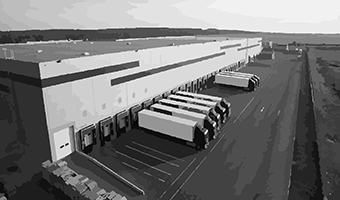UK-wide industrial and logistics take-up totalled 99.2m sq ft in 2016, up 3% on 2015 and 6% above the five-year annual average. Notably these figures reflect strong pent-up demand for quality premises. Grade A space accounted for a record 34% share of total take-up.
The uplift in demand was driven by a record year of activity in the logistics sector where take-up increased by 6%, surpassing 2014’s previous high and totalled 37.3m sq ft. Accounting for over 20% of logistics take-up – a record share for a single occupier – and pivotal to the sector’s success, is e-commerce retailer Amazon.
However, despite improved take-up year-on-year, there was a greater depth to the market in 2015, with some significant development in the medium-sized sector (10-50,000 sq ft). Of particular note, take-up in the mid-box warehouse (50-100,000 sq ft) market was down 24% year-on year.
Uncertainty fails to hinder rental growth
Uncertainty surrounding the EU Referendum also did little to hinder rental growth in the sector – an ongoing lack of supply has driven another year of strong rental growth. Across 60 UK markets, prime headline rents increased by 5.3% in 2016, rising from 3.9% in 2015.
The North West was the star performer, seeing the strongest growth in both prime and secondary stock, rising by 10.3% and 12.9% respectively.
Steve Williams, Head of Industrial and Logistics at Lambert Smith Hampton, said: “Reflecting on a tumultuous 2016, it is remarkable just how strong the year turned out to be for the UK industrial and logistics sector. Rental growth not only continued – it accelerated; logistics take-up surged to a new record and pricing in the investment market stands higher now than it did pre-Referendum.
“2016 was, however, flattered by Amazon, who took an unprecedented share of the market, which underlines how the drivers of demand have changed radically from the last cycle. Meanwhile, greater uncertainty in the economic outlook engendered by last summer’s vote has arguably intensified investor demand for the sector, with tight supply and underlying structural change in consumer patterns elevating the sector into something of a safe haven.”
“In order to find a value in today’s market, investors and developers need to be more forensic in their study of the sector; developers and investors would also do well to look at the smaller size bands, 0-50,000 sq ft, where shortages are at their most acute.”
Development failing to address fall in supply
Despite a resurgence of development, overall supply fell by a further 18% in 2016 to stand at a new low of 161.1m sq ft. 10m sq ft of speculative development was delivered in 2016, pushing the supply of Grade A space to 19%, improving from a low of 9% in 2013.
In terms of key size categories, the logistics (100,000 sq ft) and small and medium categories (>50,000 sq ft), saw a reduction in supply, falling 5% and 30% year-on-year respectively. In contrast, mid-box supply increased by 21% during 2016, driven by an increase of second-hand space coming back to the market.
Greater London and the South West remain tightly supplied markets; both saw modest increases in 2016 due to new speculative development. All other regions witnessed a fall in supply, most notably the West Midlands, where it fell 27% year-on-year, despite being a key focus of development.
Lack of stock a frustration for investors
In the investment market, a solid finish to the year took the total volume of transactions for 2016 to £5.2bn, down 9% on 2015, but 7% above the five-year annual average. Investors continue to be lured to the sector’s attractive occupier market fundamentals with industrial and logistics accounting for 11.1% of All Property volume in 2016 – its highest share of activity since 2009.
Download the Report's executive summary by clicking on the 'Download' link at the top of this page or email Steve Williams to request a copy of the complete report.
REGISTER FOR UPDATES
Get the latest insight, event invites and commercial properties by email







